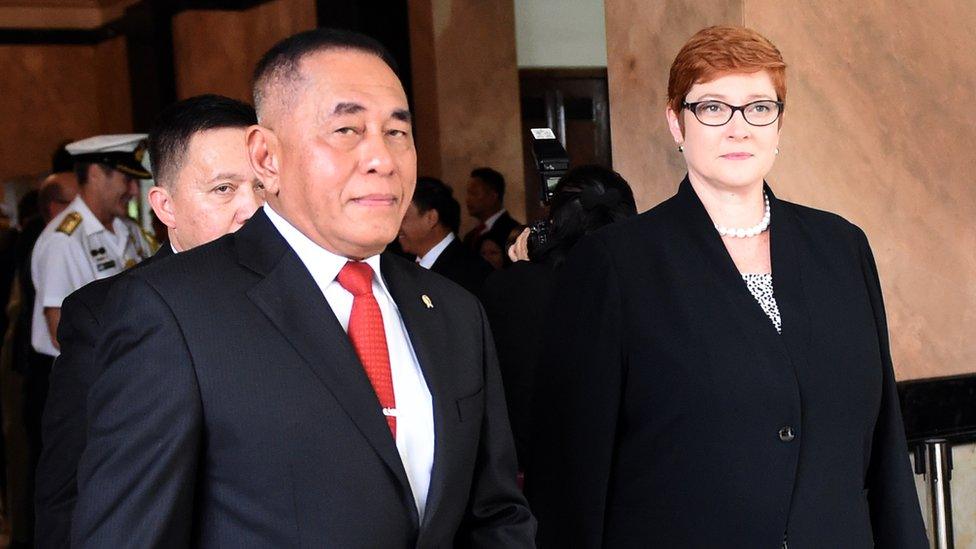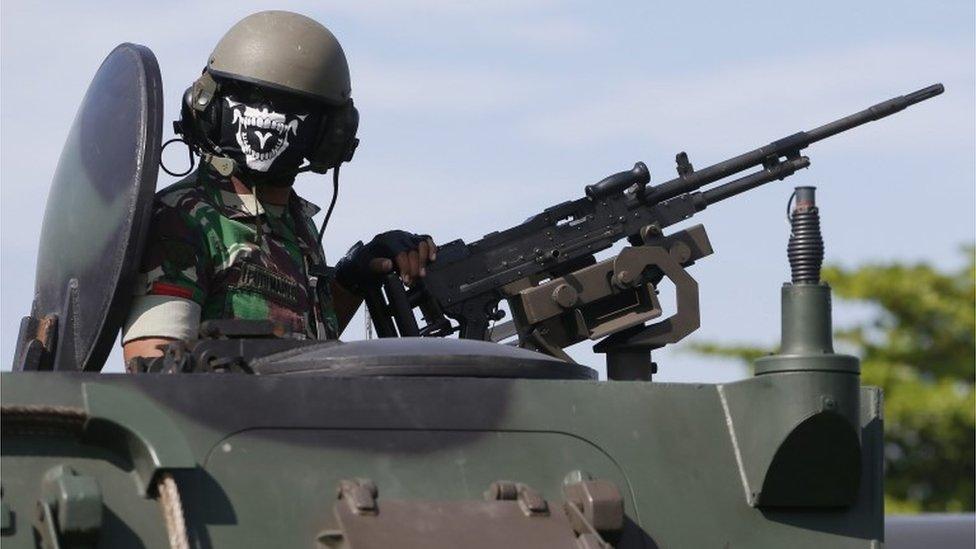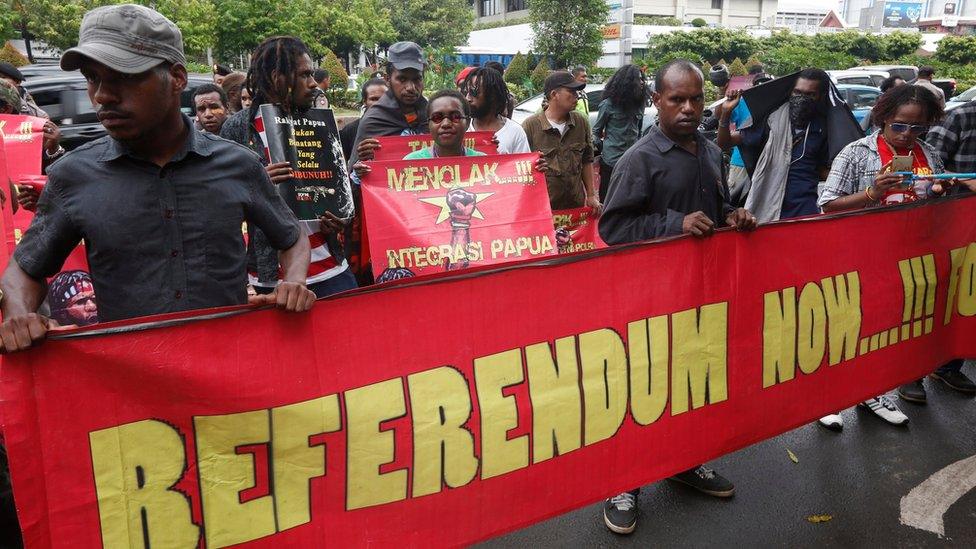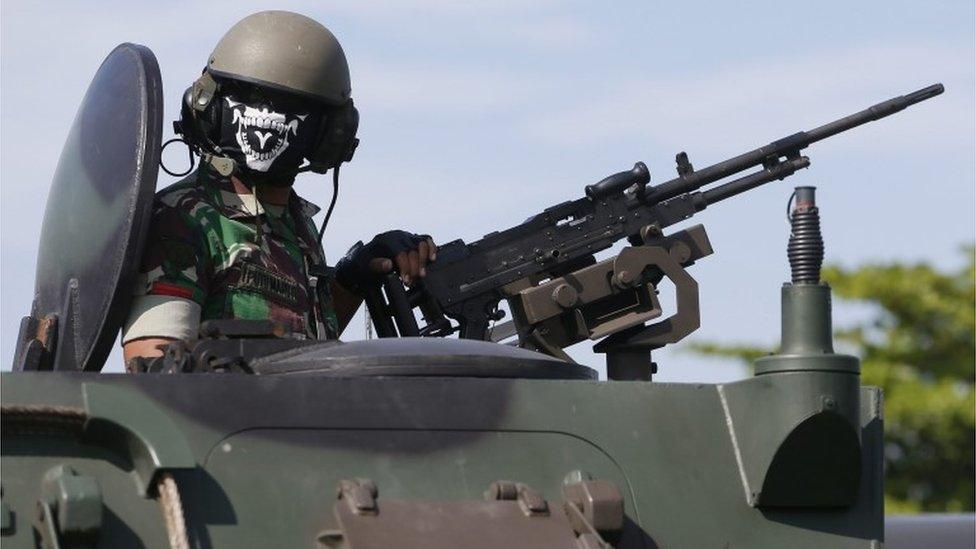Indonesia 'not suspending' all military ties with Australia
- Published

Indonesia's Defence Minister Ryamizard Ryacudu and Australian counterpart Marise Payne met last year
Indonesia has not suspended all military co-operation with Australia, its security minister says, contradicting earlier statements.
On Wednesday the military said all forms of co-operation were on hold, with things needing "to be improved".
But Wiranto, who goes by one name, said the suspension related only to a language-training programme.
The row relates to "teaching materials" at an Australian army language facility, officials say.
Indonesia's military chief said the materials included "unethical stuff" that discredited the military.
How close are Australia and Indonesia?
It is not the first time official statements about the matter have contradicted one another.
Earlier, Indonesia's President Joko Widodo said relations with Australia remained "in a good condition". He confirmed he had sanctioned the suspension despite his spokesman denying he had any part in the decision.
Australian Defence Minister Marise Payne, meanwhile, said she was confident co-operation would soon be restored.

An Indonesian special forces unit reportedly trains in Perth
Indonesia's army spokesman Maj Gen Wuryanto had said the halt in co-operation came into force in December.
Military chief General Gatot Nurmantyo said the teaching materials in question were "about soldiers in the past, East Timor, Papuan independence and 'Pancasila'", a reference to Indonesia's founding philosophy.
A low-level separatist conflict has simmered in Papua province for almost half a century.
Senator Payne said an official inquiry into the dispute would be completed soon.
"I would hope at the conclusion of the inquiry, when we're able to indicate to Indonesia the steps that have been taken in Australia to address any of these concerns, we'll be able to discuss resuming the relationship across the board then," she told the Australian Broadcasting Corp (ABC).
She said the issue of Papua was raised by Indonesia, but she said Australia "of course" recognised Indonesia's "sovereignty and territorial integrity".

Many Papuans want self-determination - something Indonesia has long rejected
Senator Payne also denied a claim that Australia had tried to recruit Indonesian officers in the past.
The allegation was made by General Gatot during a speech in November, according to the ABC, external.
"Every time there is a training programme - like recently - the best five or 10 students would be sent to Australia. That happened before I was chief so I let that happen," he was quoted as saying.
"Once I became chief commander of the national forces, it did not happen again. They will certainly be recruited. They will certainly be recruited."
Senator Payne said this was "not the case and it is something which we would not countenance, of course".
Indonesian special forces group Kopassus trains with the Special Air Service in Perth, according to local media.
The countries' navies had been expected to take part in multinational training exercises next month.
"Whether or not we will continue with the joint exercise, I will have to get back to you on that," First Admiral Jonias Mozes Sipasulta, from the Indonesian navy, told the ABC.
Bilateral relations have been tense at times in recent years, and have been suspended before, although there had been recent signs of improvement.
Military co-operation between the two nations covers a number of areas, including border control and counter-terrorism.

What is Pancasila?
The official philosophical foundation of the Indonesian state.
Consists of two Javanese words, originally from Sanskrit: "panca" meaning five and "sila" meaning principles.
The principles are: The one God system (monotheism), just and civilised humanity, the unity of Indonesia, democracy and social justice for all.
Ignoring these principles is illegal. For instance, Indonesians must hold a religion because of the first one - being an atheist is illegal in the country.

- Published4 January 2017
